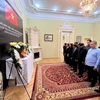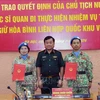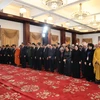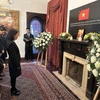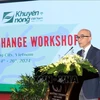The Government has allocated 300 billion VND (15.4 million USD) for the national programme on kindergarten education in 2011, according to the Ministry of Education and Training (MOET).
The programme has made the building of 16,400 new classrooms a priority in its bid to make kindergarten compulsory for five-year-olds across the country.
Deputy Minister of Education and Training Nguyen Thi Nghia said that it was difficult to build enough classrooms.
Currently, many provinces had over half of their communes and wards without kindergartens and were forced to borrow venues to teach, Nghia said.
Dak Lak province has 21 communes without kindergartens; Cao Bang province has 125 communes without kindergartens and 70 percent of the existing classrooms are temporary structures.
In Lao Cai Province , there are 184 kindergartens and nurseries and 83 percent of their classrooms are temporary.
At a workshop held recently in HCM City, Pham Ngoc Phuong, deputy head of MOET's School Infrastructure and Equipment Department, said the ministry would provide a list of companies that can provide good quality toys and teaching aids to stop child education centres from buying poor quality ones.
A check of toys and teaching aids at kindergartens nationwide in the 2010-11 school year found a large number of them substandard, Phuong said.
Under the programme, refresher training courses for kindergarten teachers would be provided to prepare them for the new education programme.
Le Minh Ha, head of the MOET's Kindergarten Education Department, said so far kindergarten was compulsory in only 25 out of the country's 63 provinces and cities. Only 35 percent of provinces had attendance rates of 95 percent.
Five of these 25 provinces and cities approved the plan, Ha said.
The remainder were asked by Nghia to find the funds to carry it out, using money from local budgets, official development assistance and other sources
MOT is also working with the Ministry of Finance and the Ministry of Planning and Investment to set up a kindergarten education project for disadvantaged kids by 2015 with 50 million USD from the World Bank's preferential loans./.
The programme has made the building of 16,400 new classrooms a priority in its bid to make kindergarten compulsory for five-year-olds across the country.
Deputy Minister of Education and Training Nguyen Thi Nghia said that it was difficult to build enough classrooms.
Currently, many provinces had over half of their communes and wards without kindergartens and were forced to borrow venues to teach, Nghia said.
Dak Lak province has 21 communes without kindergartens; Cao Bang province has 125 communes without kindergartens and 70 percent of the existing classrooms are temporary structures.
In Lao Cai Province , there are 184 kindergartens and nurseries and 83 percent of their classrooms are temporary.
At a workshop held recently in HCM City, Pham Ngoc Phuong, deputy head of MOET's School Infrastructure and Equipment Department, said the ministry would provide a list of companies that can provide good quality toys and teaching aids to stop child education centres from buying poor quality ones.
A check of toys and teaching aids at kindergartens nationwide in the 2010-11 school year found a large number of them substandard, Phuong said.
Under the programme, refresher training courses for kindergarten teachers would be provided to prepare them for the new education programme.
Le Minh Ha, head of the MOET's Kindergarten Education Department, said so far kindergarten was compulsory in only 25 out of the country's 63 provinces and cities. Only 35 percent of provinces had attendance rates of 95 percent.
Five of these 25 provinces and cities approved the plan, Ha said.
The remainder were asked by Nghia to find the funds to carry it out, using money from local budgets, official development assistance and other sources
MOT is also working with the Ministry of Finance and the Ministry of Planning and Investment to set up a kindergarten education project for disadvantaged kids by 2015 with 50 million USD from the World Bank's preferential loans./.
